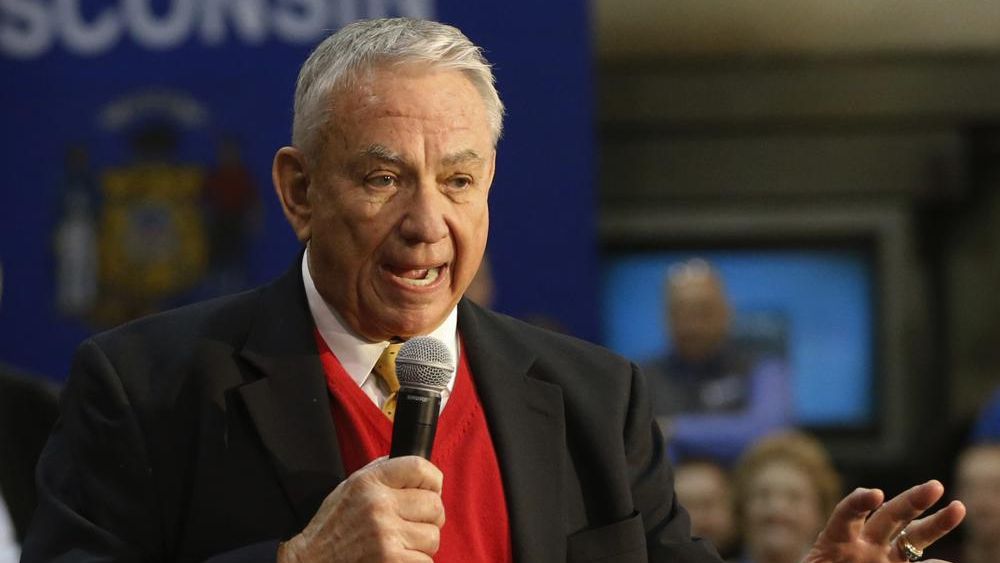MADISON, Wis. (AP) — Tommy Thompson, the 80-year-old former governor who has spent more than 50 years in public service, said in a sometimes emotional farewell address Friday that the University of Wisconsin System has emerged from the COVID-19 pandemic stronger than before he took over as interim president.
Thompson took the temporary job in the early months of the pandemic in July 2020 and held it until a permanent successor was named.
His voice cracking with emotion, Thompson promised he would remain engaged.
“While I am stepping down from the UW System next month, I am not stepping down from Wisconsin,” he said.
The Board of Regents unanimously approved removing “interim” before his title for the final month of his time in the job, one last symbol of appreciation for the work he’s done. Thompson’s tenure ends on March 18, making way for incoming president Jay Rothman, a Milwaukee attorney with no experience in higher education administration.
Thompson on Friday focused on his work guiding the UW System through the pandemic, including testing for COVID-19, getting students, faculty and staff vaccinated and reopening campuses in the fall of 2021.
“I had to make the tough decision,” Thompson said. “I was, and remain convinced, this was the right decision for our students. I must admit, though, that not everybody on the board was with that call and not all of the chancellors supported that.”
He said that the percentage of classes held in person this year is back to where it was before the pandemic.
“When I vowed to keep the UW open and safe, many said it couldn’t be done – but we succeeded,” Thompson said.
As part of his “Smash COVID” campaign, Thompson filmed a series of videos of him smashing a variety of objects with a sledgehammer, including watermelons and birthday cakes, to drive him the message to get tested and vaccinated for the virus.
Thompson, a Republican, also worked hard to improve the university’s often strained and combative relationship with the GOP-controlled Legislature. When some Republicans threatened to sue Thompson for not seeking legislative approval for the university’s COVID-19 policies, Thompson refused to budge.
Ultimately, lawmakers backed down.
Thompson said the university has also cut costs and is in a strong financial position and an enrollment drop this year of just above 1% is lower than the national average. Applications for next year were up 3.9%, compared with a drop for public schools nationwide of 3.1%, Thompson said.
Thompson also touted the fact that the Legislature and Democratic Gov. Tony Evers also lifted an eight-year freeze on in-state tuition and returned rate-setting powers to the regents under Thompson’s watch.
The regents ultimately chose not to raise in-state tuition for the 2021-22 academic year.
Thompson said the relationship with the Legislature, and members of both political parties, has “significantly improved.”
“You can almost feel it,” Thompson said. “They’re actually anxious to see us.”
Thompson has been praised by lawmakers from both parties as his time as UW president ends.
But Democratic state Rep. Gordon Hintz, who was minority leader during debate of the past budget, said on Twitter in reaction to Thompson’s speech that UW should have fared better in the state budget written by Republicans, and signed by Evers, than it did.
“Any improved relationship did nothing financially for the UW System,” Hintz said. “The scoreboard shows a loss.”
Thompson’s name is synonymous with Wisconsin politics. A graduate of UW-Madison and its law school, Thompson won election to the state Assembly in 1966 and was a member there in 1971 when the Legislature voted to create the UW System.
Thompson remained in the Assembly until he was elected governor in 1986. He went on to win reelection to three more four-year terms, a state record.
Thompson resigned as governor midway through his fourth term in 2001 to become U.S. Health and Human Services secretary under then-President George W. Bush. After leaving that job in 2005, Thompson mounted a brief run for president in 2008 and also ran for U.S. Senate in 2012, losing to Democrat Tammy Baldwin.
He kept a lower profile after the loss before he was tapped to serve as interim UW president after the search for a successor to Ray Cross failed.



